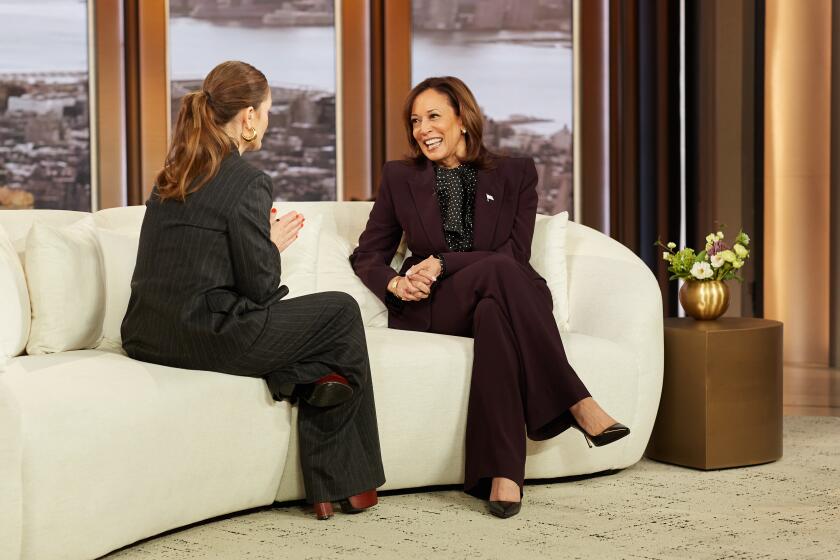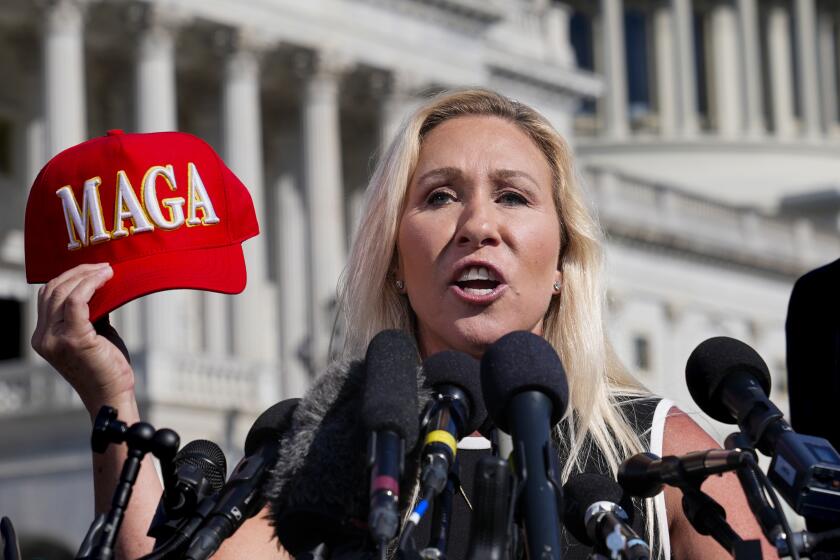Kerry Says President Hid Truth on Medicare Costs
Sen. John F. Kerry broadened his effort to undercut President Bush’s credibility on Tuesday by accusing the administration of “hiding the truth” about rising out-of-pocket costs that older Americans pay for Medicare.
Surrounded by senior citizens at a campaign forum, the Democratic nominee for president said the administration tried to conceal records that showed the growing burden of Medicare premiums and related costs.
“This administration can’t tell you the truth about healthcare,” Kerry told the crowd.
Joining the attack on Bush’s trustworthiness was Kerry’s running mate, North Carolina Sen. John Edwards. Campaigning in Oregon, he seized on a report that Bush’s second-term agenda would cost $3 trillion over 10 years -- far above the price of Kerry’s plans.
“He’s making proposals that are in the trillions of dollars in cost, for which he has no idea how he’s going to pay,” said Edwards, who likened Bush to indicted former Enron Chairman Kenneth L. Lay.
“You know, I think he believes that he’s Ken Lay, and America is his Enron,” Edwards said.
The Democratic ticket’s one-two punch was part of a newly vigorous push to recover from more than six months of Bush campaign attacks on Kerry’s credibility. Kerry pursued that effort Tuesday in two of the most fiercely contested swing sttes, Wisconsin and Ohio. Recent polls show Bush pulling ahead of Kerry in both states.
Kerry’s attack also demonstrated the central role that rising healthcare and prescription drug costs are playing in the November election. Today, Kerry plans to start airing a Spanish-language television ad that spotlights his pledge to ensure health coverage for every child.
At Kerry’s morning forum Tuesday in a Milwaukee senior citizens center, the Massachusetts senator illustrated his latest attack on Bush by holding up sheets of paper with obscure charts in tiny print.
He pointed to healthcare costs that the administration -- for the first time -- omitted this year from its annual Medicare report. They were made public Tuesday on the front page of USA Today. In a tone of mock disbelief, Kerry said the missing figures, which showed a spike in out-of-pocket Medicare costs for the elderly, happened to cover the 2004 election year.
“Oh my gosh, it’s empty,” he said. “A great, big question mark. They hid it from you. They didn’t want you to know what the costs were.”
The figures show that Medicare expenses for the average 65-year-old are expected to rise from 14% of the person’s Social Security check in 2000 to 37% in 2006.
“Once again, this administration hides the truth from the American people,” Kerry said.
Dr. Mark McClellan, the administrator of Medicare, said he was “not going to get into any political charges” but described Kerry’s remarks as “misleading.” He said savings from the new Medicare prescription-drug benefit would offset the higher costs.
A key source of the overall rise in Medicare costs is the upcoming 17% increase in premiums announced this month by the administration. The increase, which takes effect next year, has drawn sharp criticism from Kerry and Edwards, who use it to portray Bush as insensitive to the needs of Americans -- whether elderly or not -- who struggle to make ends meet.
On Capitol Hill, Republicans tried Tuesday to blunt the criticism and shield Bush from blame. At a Senate Finance Committee hearing on Medicare, Republicans challenged Kerry’s standing to criticize the higher premiums, saying it was dictated by laws and policy changes that the Democrat supported.
“President Bush is not to blame for this,” said Sen. Gordon Smith (R-Ore.). “He is following the law -- a law that Sen. Kerry and I both voted for.”
The cost hike was indeed mandated under a 1997 law that requires premiums to rise as costs go up in the part of Medicare that pays for doctor bills. Next year, Medicare costs are expected to rise steeply for a variety of reasons, including a provision of the 2003 Medicare law that increased reimbursements to doctors and payments to encourage managed-care plans to participate in the program.
That 2003 law has led to fierce campaign sparring. The law expanded Medicare to cover prescription drugs and introduced new incentives for the elderly to join private managed care plans.
But some Republicans worry that it could hurt their party if Bush and his allies do not move aggressively to explain it clearly to voters.
“When the Kerry people come out and say, ‘Bush increased your premiums,’ it is just wrong, but it is up to the administration to correct that,” said Sen. Jon Kyl (R-Ariz.).
He said the administration needed to do more to educate the elderly about benefits provided under the new law.
For Kerry, the law has become a favorite target on the campaign trail. In Milwaukee on Tuesday, he said the administration intentionally hid the full, $534-billion cost of the new prescription drug benefit, which Congress had projected at $395 billion. Kerry said the administration “intimidated and bullied” an official to keep him from telling Congress the real price. The administration denies both charges.
Kerry also renewed accusations Tuesday that Bush and his Republican allies in Congress favored insurance and pharmaceutical companies over consumers when they approved the drug benefit. He pointed to the ban on the Medicare program’s purchasing of drugs in bulk to secure lower prices and the Republicans’ refusal to let Americans buy lower-cost Canadian prescription drugs.
Kerry also responded to a new Bush campaign television ad saying his healthcare plan would put “big government in charge, not you, not your doctor.”
“I have no new bureaucracy at all in my program,” he said in Milwaukee. “You choose your doctor. You choose your plan.”
In response to Kerry’s remarks, Bush campaign spokesman Steve Schmidt said the senator voted for higher taxes on Social Security benefits, opposed the Medicare prescription drug bill and voted for the formula that led to higher Medicare premiums.
“Voters,” he said, “will not trust a candidate whose political attacks are refuted by his own record.”
As for the Edwards allegation that Bush’s second-term agenda would cost $3 trillion, Schmidt disputed the Washington Post story on which it was based and said the actual figure was $74 billion.
Finnegan reported from Milwaukee, Hook from Washington. Times staff writer Mark Z. Barabak, in Portland, Ore., also contributed to this report.
More to Read
Get the L.A. Times Politics newsletter
Deeply reported insights into legislation, politics and policy from Sacramento, Washington and beyond. In your inbox three times per week.
You may occasionally receive promotional content from the Los Angeles Times.








